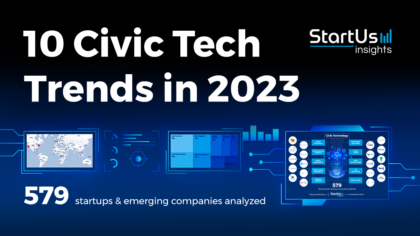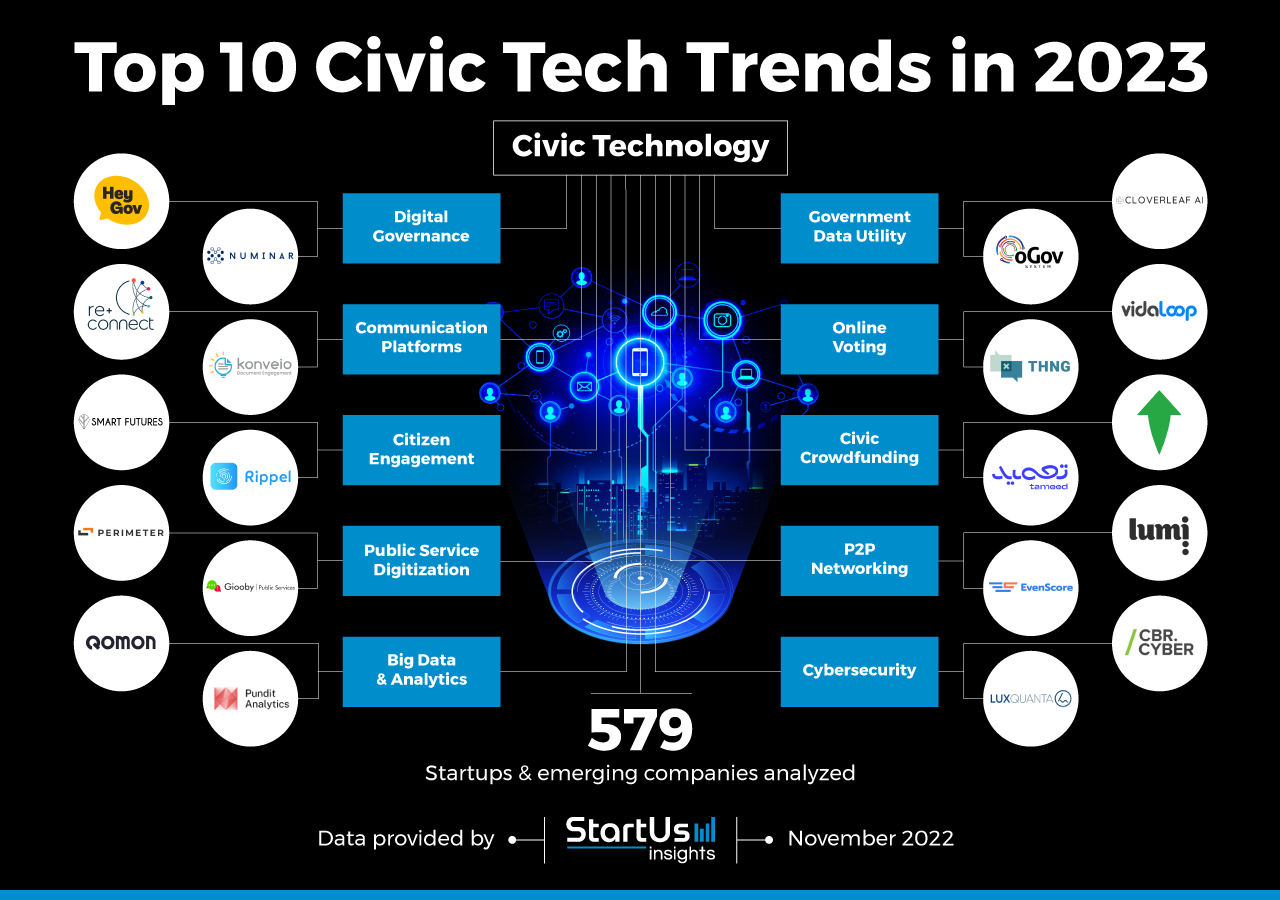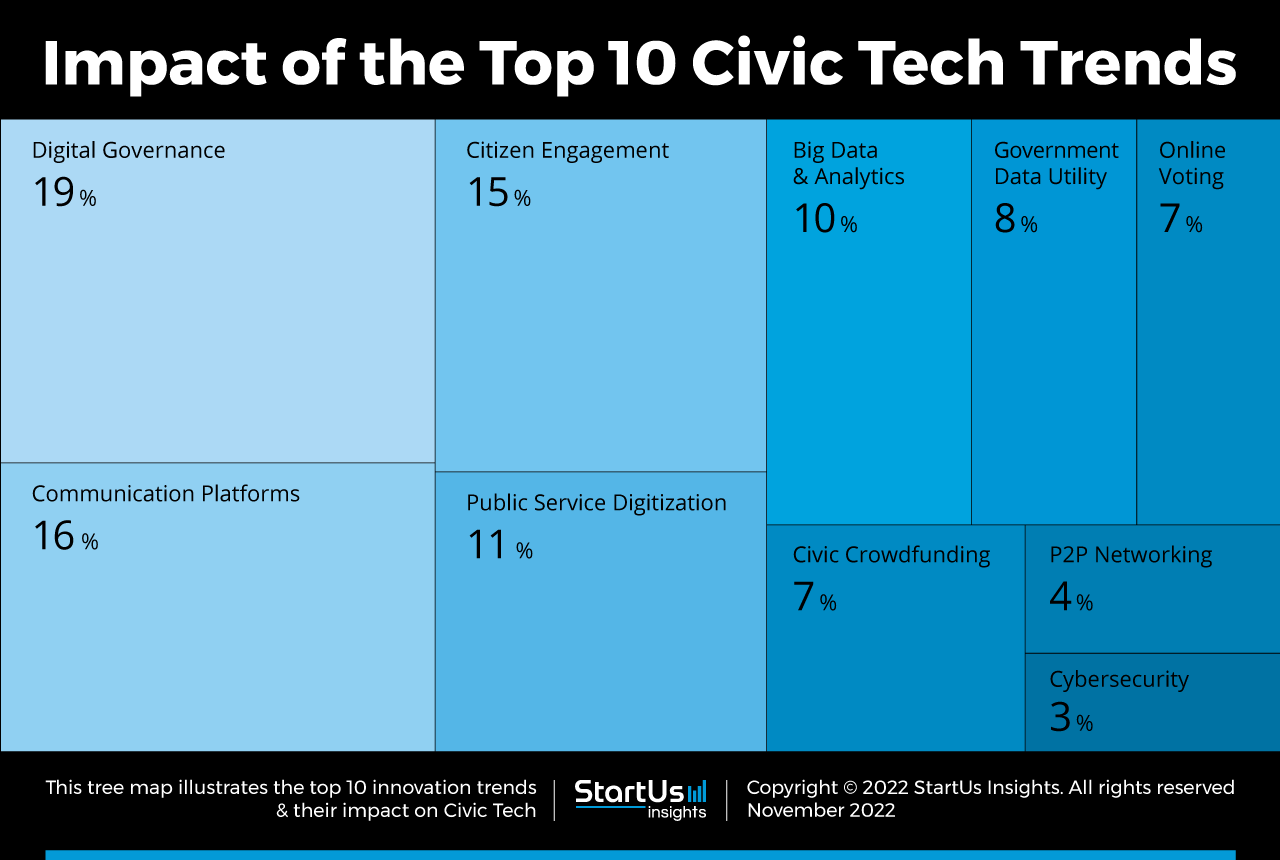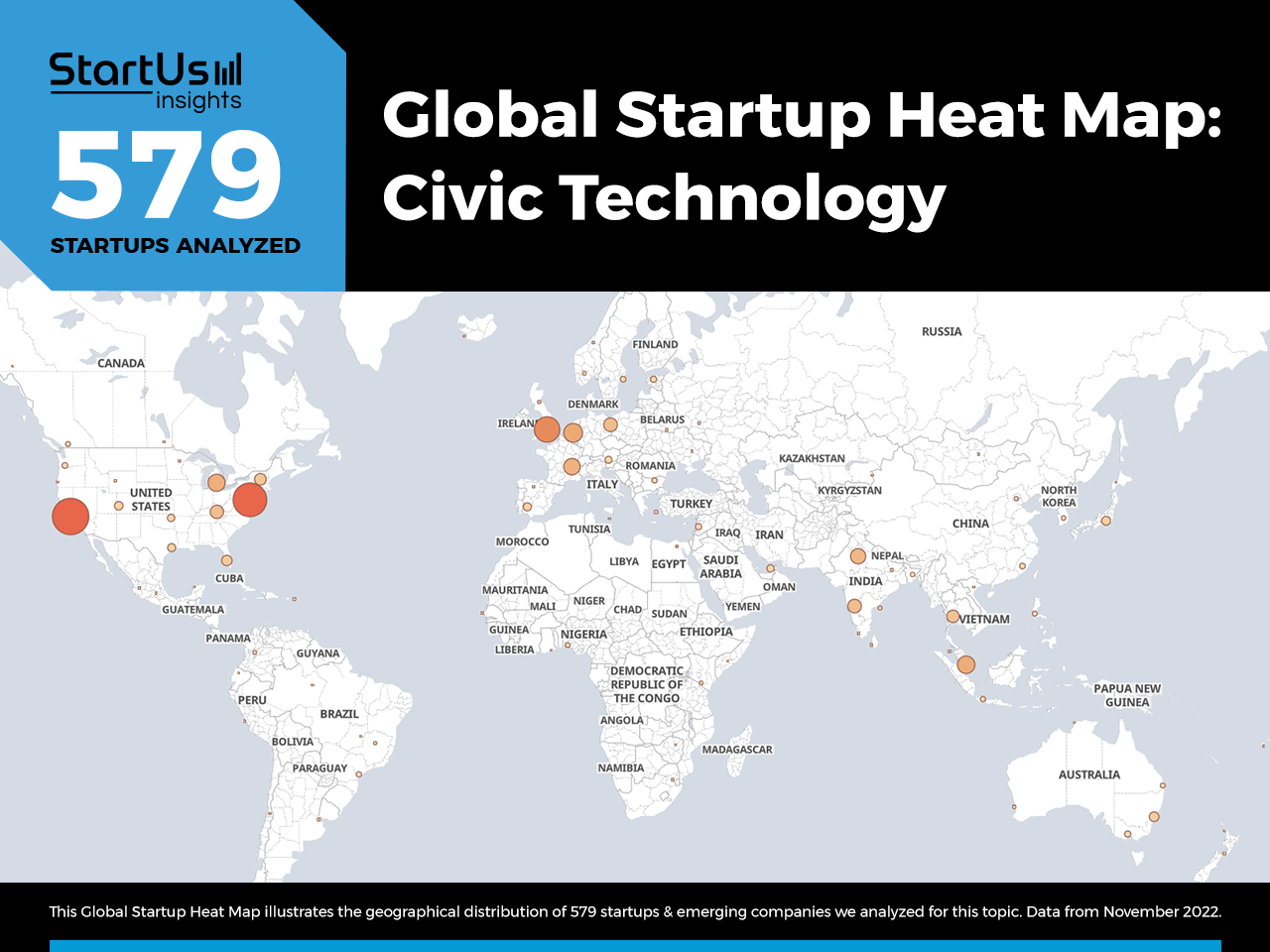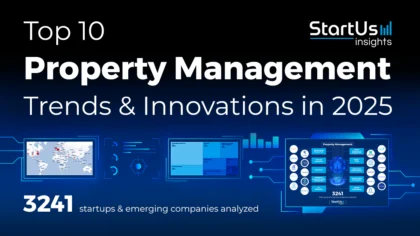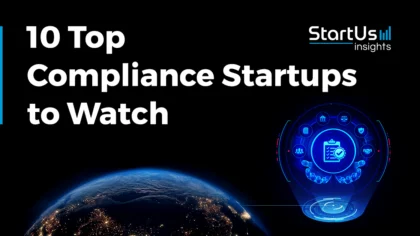Accelerate Productivity in 2025
Reignite Growth Despite the Global Slowdown
Governments around the world face rising challenges from demographic and economic pressures. As public finances are squeezed and difficult decisions loom, lawmakers are turning their focus on technology solutions to civic challenges. Advances in digital technologies and data platforms promote transparency in legislation and enable greater involvement of citizens in government decisions. This report provides an overview of civic tech trends and innovations in 2023. They range from citizen engagement and government data utility to digital governance and cybersecurity. Read more to find out how these trends impact government communication and operations globally.
Innovation Map outlines the Top 10 Civic Tech Trends & 20 Promising Startups
For this in-depth research on the Top Civic Tech Trends & Startups, we analyzed a sample of 579 global startups & scaleups. The result of this research is data-driven innovation intelligence that improves strategic decision-making by giving you an overview of emerging technologies & startups in the Civic Tech industry. These insights are derived by working with our Big Data & AI-powered StartUs Insights Discovery Platform, covering 2 500 000+ startups & scaleups globally. As the world’s largest resource for data on emerging companies, the SaaS platform enables you to identify relevant startups, emerging technologies & future industry trends quickly & exhaustively.
In the Innovation Map below, you get an overview of the Top 10 Civic Tech Trends & Innovations that impact 579 companies worldwide. Moreover, the Civic Tech Innovation Map reveals 20 hand-picked startups, all working on emerging technologies that advance their field.
Top 10 Civic Tech Trends
- Digital Governance
- Communication Platforms
- Citizen Engagement
- Public Service Digitization
- Big Data & Analytics
- Government Data Utility
- Online Voting
- Civic Crowdfunding
- P2P Networking
- Cybersecurity
Tree Map reveals the Impact of the Top 10 Civic Tech Trends
Based on the Civic Tech Innovation Map, the Tree Map below illustrates the impact of the Top 10 Civic Tech Trends in 2023. Digital governance solutions allow political leaders to better understand their constituencies while communication platforms connect them with citizens more directly. At the same time, civic engagement and online voting platforms strengthen the inclusion of citizens in legislative decision-making. Advances in public service digitization, civic crowdfunding, and peer-to-peer (P2P) networking solutions further improve the livability factor of cities and their citizens. Government data utility also serves to improve legislative transparency with big data and analytics, providing insights from the vast amount of publicly available data. Lastly, cybersecurity solutions protect government and citizen data from malicious hackers to avoid sensitive data leaks.
Global Startup Heat Map covers 579 Civic Tech Startups & Scaleups
The Global Startup Heat Map below highlights the global distribution of the 579 exemplary startups & scaleups that we analyzed for this research. Created through the StartUs Insights Discovery Platform, the Heat Map reveals that the US and the UK, followed by Europe, India & Singapore, witness the most startup activity.
Below, you get to meet 20 out of these 579 promising startups & scaleups as well as the solutions they develop. These 20 startups are hand-picked based on criteria such as founding year, location, funding raised, & more. Depending on your specific needs, your top picks might look entirely different.
Top 10 Civic Technology Trends
1. Digital Governance
Currently, democracies face rising challenges from corruption in politics, services, industry, misinformation, and more. Besides, the general lack of clarity in administrative services and excessive paperwork reduces citizen involvement in government. Digitization of paper-based systems and public services solves these problems as it promotes transparency and accountability between governments and citizens. Moreover, transitioning to digital workflows optimizes policymaking and operations. The challenge remains to develop solutions that are easy to use for all citizens.
HeyGov digitizes Municipal License & Permit Payments
HeyGov is a US-based startup that provides a platform to accept online payments for permits and license applications. The platform digitizes paper forms and lets citizens fill out and sign forms online. It also features automated workflows and accepts credit card payments with an additional handheld point of sale (POS) terminal that accepts in-person payments. Additionally, it works with existing paper-based systems and also features a companion mobile app. Through this solution, municipalities give their citizens the option to easily and securely pay for parking tickets, permits, and more.
Numinar develops a Political Campaigning Platform
US-based startup Numinar develops an intelligent political campaign data platform. It uses voter files and commercial data that considers 400 demographic and socioeconomic data points. The platform also features AI-based modeling, texting, calling, and canvassing, in addition to voter list building and management. This allows political parties to understand their voter base and tailor their campaigns and communication activities.
2. Communication Platforms
The lack of communication tools or channels between governments and citizens hinders feedback between policy-makers and civilians, leading to corruption and sub-optimal services. Besides, many communities are unable to voice their concerns to government bodies due to this. Through the use of open government data, communication platforms are able to provide insights into government policies. Such solutions also connect citizens and governments to provide a voice to underserved communities.
re+connect advances Community Disaster Resilience
Puerto Rican startup re+connect creates a communication solution for last-mile disaster relief. It uses machine intelligence and human networks to inform and coordinate action. Through the startup’s mobile app, residents are able to crowdsource information about individual needs and capacities for themselves and others. It then matches communities with relief resources and services based on the community crowdsource data intelligence. Through this solution, communities become more resilient to disasters through better information networking and timely humanitarian aid.
Konve provides Open Government Partnership Reporting
Konve is a US-based startup that creates a document engagement platform for better communication plans, design drafts, or policies. Governments upload reports on the platform for public feedback and comments. Users then have up to two weeks to evaluate documents and provide feedback. Besides enabling comments on documents, it contains threaded replies, self-categorized comments, privacy protection, access management, and more. The platform lets governments participating in the Open Government Partnership program upload reports and promote transparency, anti-corruption, citizen empowerment, and responsive governance.
3. Citizen Engagement
Political leaders clearly state their term objectives during the time of election but during their term, there is little to no information. Moreover, the only connection between citizens and their elected officials is often through their votes. These are being solved through the development of applications that let citizens report issues, provide feedback on legislation, and collaborate on public development projects. This encourages more open discussions on community issues between citizens and governments and also keeps citizens in the policy-making feedback loop.
Smart Futures creates an AI-based Citizen Engagement Platform
French startup Smart Futures creates collaboration tools to foster engagement between governing bodies and their citizens. The startup’s apps offer reports and suggestions through location-based data, participatory governance that involves audiences in decisions, gamification, and more. Besides, they feature a monitoring and management platform to analyze reports, survey audiences, and optimize interventions. This enables municipalities to collaborate with citizens in data collection and decision-making to improve spaces and services.
Ripple connects Citizens with Political Leaders
Ripple is a Canadian startup that develops a mobile app that lets citizens engage with local elected officials. The app connects users directly with politicians based on their postal code and lets them stay connected through the elected term. It allows citizens to stay up to date with the latest legislation and their leaders while tracking their stance on issues. Through this, they are able to raise their issues directly with their elected officials through emails or phone calls.
4. Public Service Digitization
The rapidly increasing population creates long queues to access public services and affects the quality of life in cities. As cities expand, this further introduces challenges in tracking and addressing public problems. That is why startups are developing solutions to digitize public services and provide citizens ease of access and convenience via the internet. Additionally, public service digitization allows cities to reduce operating costs and bottlenecks in public utility-related activities.
Perimeter advances Emergency Responder Communication
US-based startup Perimeter develops a platform that provides situational intelligence for public safety. The platform enables real-time coordination across the fire, law, and emergency services management departments. It also features pre-planning to prepare for incidents in advance, a real-time information hub, and integrated public communications to inform residents. Perimeter’s platform prevents chaos and confusion during disasters such as wildfires by establishing clear communication between emergency services and citizens.
Giooby aids Public Services Issue Reporting
Giooby is a US startup that develops a smart-city platform to digitize public services. The Giooby platform features a mobile app, Citizen, that lets citizens report issues and receive real-time progress notifications. Besides, the startup offers municipal managers a web portal that provides process overviews as well as route optimization and worker management tools. Moreover, it increases citizen engagement through the gamification of citizen reports which serves to encourage people to highlight issues within their city.
5. Big Data & Analytics
Open data systems promote accountability and traceability of government actions. However, the abundance of public information makes it difficult to extract accurate information and generate useful insights. Therefore, startups are using advances in AI, high-performance computing (HPC), and more to develop platforms that are able to quickly analyze civic data. Big data and analytics let campaign managers aggregate demographic data from multiple sources and enable political analysts to uncover trends.
Qomon develops a Citizen Mobilization Platform
Qomon is a French startup that develops a software-as-a-service (SaaS) digital organizing tool. The startup’s political software combines data mapping and profile analytics to identify high-priority zones and people. It also lets campaign managers mobilize citizens that make a positive difference in their campaigns. Besides mapping and analytics, the software features real-time monitoring of participating supporters and visualizes their geographic coverage. Qomon’s platforms let NGOs, political campaigns, and more effectively engage and collaborate with citizens with data-driven insights.
Pundit Analytics offers a Searchable Political Content Database
Pundit Analytics is a US-based startup that offers a publicly searchable database for political digital content. It allows users to find political content across Twitter, Facebook, websites, etc., and receive custom daily email briefings and political trends. It also contains online profiles of all elected governors, the U.S. Senate, and the U.S. House of Representatives as well as a selection of challenger candidates. This provides politicians and individuals with information and trends that influence campaigns, lobbying, and news media outlets.

6. Government Data Utility
Governments across the world are implementing open data practices and digitalization in an effort to provide more transparency to their citizens. Even with the abundance of information like budget data and municipal reports,. its unusability hinders analytics capabilities and other data-driven solutions. To overcome this, startups are developing tools that let individuals and businesses analyze open government data. Such solutions enable them to track governmental policies, understand and monitor budgets, and filter information that’s important to them.
Governments generate vast amounts of open data which is difficult for the public to manually monitor and analyze. Moreover, without the proper analysis and auditing of the data, the underlying problem of government corruption remains unresolved.
Cloverleaf AI enables Government Video Meeting Monitoring
US-based startup Cloverleaf AI develops a solution that automatically monitors government meeting videos. The platform contains features that let political analysts and auditors create custom topics that impact them. It also provides daily alerts with clips that provide all the relevant information and monitors government interactions at scale to gain insights for business decisions. Additionally, the platform provides a historical analysis of each meeting analyzed over time and transcripts of every meeting.
Ogov System develops Accountability Tools
Ogov System is a Spanish startup that creates a suite of tools for governmental transparency and accountability. The startup’s tools include a portal that gives citizens a clear and concise overview of government data. It also features a module for evaluation entities, such as transparency councils, to perform data assessments. Besides, Ogov provides tools that allow citizens to make proposals, participate in voting, and make contributions to budget preparation. These tools not only serve in the analysis and tracking of government data but also allows citizens to actively participate in policy-making.
7. Online Voting
Voting is an important civil right as it allows citizens to express their support for a particular political party as well as impact economical and social growth. However, voting in person typically means standing in long queues which severely reduces voter turnouts and compromises election integrity. Therefore, startups are developing secure mobile and online voting applications that allow users to cast votes from any place and at any time. Besides, making the voting data immutable prevents any problems associated with tampering or miscounting that currently exist.
Vidaloop develops a Mobile Voting System
US-based startup Vidaloop offers a secure, transparent, and verifiable mobile voting system. It is accessible and inclusive with configurable visual, audio, language, physical, and cognitive needs of voters. The system also features a simple mobile ballot design with votes stored with full anonymity in an immutable vote storage system. Moreover, it is usable as a standalone application or integrates with existing voting systems to provide remote accessibility.
THNG offers an Online Voting App
THNG is a German startup that makes an online voting app that enables civilians to participate in democratic decisions in politics and societies. The app lets vote creators directly manage and view all votes from anywhere and on any device. It also features anonymous vote casting, cryptographic security, automatic vote counting, and more. THNG’s voting app enables cities to significantly save time and costs in the voting process while simultaneously accelerating result evaluation.
8. Civic Crowdfunding
Public infrastructure development and maintenance projects commonly face delay or neglect due to the increasing size of cities. Moreover, as budgets are stretched, municipalities receive limited finances which affect manpower hiring capability for civic projects. This is why cities are adopting civic crowdfunding solutions that allow citizens to contribute towards local government projects. Such platforms also provide financial transparency to prevent fund misuse. Through the development of civic crowdfunding solutions, startups are enabling cities to advance citizen-backed projects.
LocalDonation ensures Transparent Government Donations
German startup LocalDonation provides a crowdfunding platform for local governments. It lets citizens submit project applications, vote on submitted projects, and state their financial contributions. After a feasibility study, accepted applications receive funds through citizen donations, which are transferred to the treasurer. Thus, the platform enables an efficient, democratic, secure, and transparent method to donate to local governments.
Ta3meed enables Government Purchase Order Crowdfunding
Ta3meed is a Saudi Arabian startup that develops a platform to crowdfund purchase orders from the government. The startup’s purchasing order financing platform offers individual and institutional investors opportunities to invest in government-backed purchase orders. It also features automatic investments that nominate and invest in opportunities based on user preferences. Ta3meed’s solution thus enables citizens to crowdfund government purchase orders and receive returns on their investments.
9. P2P Networking
Modern communities are becoming splintered due to rapid urbanization as cities spread out to accommodate more citizens. This creates problems such as a lack of sense of belonging and ownership as well as reduces the livability in cities. To tackle this, startups are creating connected communities through peer-to-peer solutions for ridesharing, home renting, information crowdsourcing, and more. Through such P2P networks, residents are able to share goods and services to address the needs of their communities.
Lumi advances Community-based Ridesharing
Australian startup Lumi develops a boutique concierge ridesharing service. The startup rideshare service provides local passengers with drivers from within their local communities. Their service also features high-skill drivers who hold working with children check cards with the active screening of all drivers. The rideshare solution thus provides cities with premium local ridesharing services with greater reliability, accountability, comfort, and affordable pricing.
EvenScore develops a P2P-powered Contribution Dashboard
EvenScore is a US-based startup that develops a P2P-powered contribution dashboard for political campaigns. It lets users search for campaigns based on their interests, understand the impact of their donations, monitor campaign progress, and more. Moreover, its dashboard aggregates campaign info across multiple channels including updates, press coverage, and changes into a single view. It also lets users connect with other like-minded donors and lets them campaign on behalf of their favorite organizations and campaigns.
10. Cybersecurity
The digitization of paperwork and legislation along with the implementation of connectivity solutions across political campaigns, public services, etc. creates potential entry points for cyber threats. This leads to risks of information theft, data ransom, and data tampering. To improve risk management, governments are implementing advanced network security and cryptographic solutions that monitor and mitigate vulnerabilities in communication networks. They enable city authorities and governments to protect citizens and confidential government data.
Lux Quanta specializes in Quantum Key Distribution System
Lux Quanta is a Spanish startup that specializes in cybersecurity through quantum cryptography. The startup’s solution, Continuous Variable Quantum Key Distribution, (CV-QKD), uses quantum mechanical properties to generate shared keys between two remote network nodes, making them highly secure against cyber attacks. Moreover, the system integrates with existing optical fiber links and conventional telecommunication technologies. Lux Quanta’s solution protects telecom networks, government institutions, data centers, utilities, and more.
CBR Cyber develops Cyber Network Security
Australian startup CBR Cyber offers a wide range of cybersecurity services such as risk-based assessments and managed security services. The startup’s solutions include vulnerability management, extended detection and response, user behavior analysis, and much more. Their cybersecuity also secures corporate and government data through continuous network screening and advanced firewalls to stop intrusions. Their solution serves to protect information communication systems in the federal government and critical infrastructure use cases.
Discover all Civic Tech Trends & Startups
As governments are digitizing public services and leveraging open government platforms, they are becoming high-value targets for cyber attacks. Digital governance and citizen engagement solutions are also rising as civilians seek to be more informed on legislative decisions and eliminate corruption.
The Civic Trends & Startups outlined in this report only scratch the surface of trends that we identified during our data-driven innovation & startup scouting process. Among others, blockchain, AI, & open data platforms will transform the sector as we know it today. Identifying new opportunities & emerging technologies to implement into your business goes a long way in gaining a competitive advantage. Get in touch to easily & exhaustively scout startups, technologies & trends that matter to you!
